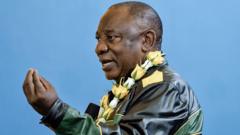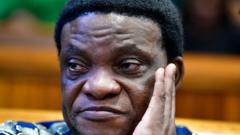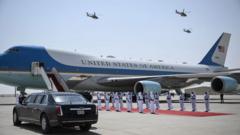President Cyril Ramaphosa's upcoming meeting with Donald Trump presents a high-stakes opportunity to reconcile strained relations between South Africa and the United States. With a history of negotiation, Ramaphosa seeks to engage in constructive dialogue focusing on trade and sovereignty, all while navigating Trump's controversial claims regarding South Africa's domestic policies.
Navigating Tensions: Ramaphosa's Strategic Visit to Washington

Navigating Tensions: Ramaphosa's Strategic Visit to Washington
South Africa’s President Cyril Ramaphosa prepares for a crucial meeting with Donald Trump aimed at mending US-South Africa relations amid ongoing tensions.
South Africa's President Cyril Ramaphosa faces a pivotal moment as he prepares to meet US President Donald Trump at the White House for the first time. Known for his negotiation skills honed during the end of apartheid, Ramaphosa's ability to mend the frayed relationship between the two nations will be put to the test.
Ramaphosa's primary goal for the visit is to secure a favorable trade agreement, amidst a backdrop of tensions that have escalated over the past months. The Trump administration has been relatively silent regarding the upcoming visit, prompting concern about the potential outcomes. Ramaphosa stated, “The trade relations are what's most important […] We want to consolidate good relations between our two countries.”
The discord between the nations intensified after Ramaphosa's government signed a bill to expropriate privately owned land without compensation, which has been controversial and criticized by Trump. Additionally, Trump's allegations about a supposed "genocide" of Afrikaners—a claim widely discredited—have further strained diplomatic ties.
Political analysts are wary of the potential for a contentious meeting, with some predicting a scenario where Ramaphosa could face humiliation if discussions do not shift away from emotional rhetoric. Professor Anthoni van Nieuwkerk noted that for engagement to be productive, it must have started long before their meeting in the Oval Office.
For Ramaphosa to leverage his skills effectively, it is suggested that common interests, such as a shared passion for golf, could provide a basis for a more convivial relationship. He has even invited Trump to play golf during the upcoming G20 Summit in South Africa, aiming to create a friendly rapport.
Analyst Dr. Lubna Nadvi emphasized the necessity for Ramaphosa's team to assert South Africa's sovereignty in the face of misinformation that has circulated in Trump’s circles. Ramaphosa's spokesperson expressed hopes that this meeting would lead to a normalization of diplomatic relations and fruitful discussions surrounding the African Growth and Opportunity Act (Agoa), which is crucial for trade.
Mr. Magwenya highlighted that South Africa does not approach this meeting as a supplicant but rather as a partner in trade, underscoring mutual benefits for both nations. The meeting represents a long-term avenue towards resolving intricate diplomatic issues, rather than an immediate fix.
As both countries face wider geopolitical pressures, analysts warn against the potential fallout if the meeting fails to turn a corner. While the stakes remain high, South Africa is poised to engage in what they hope will be a new chapter in their rocky relationship with the United States.




















